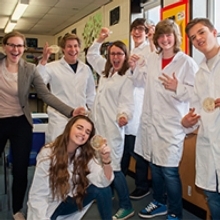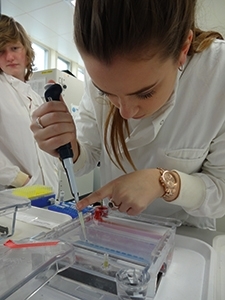Schoolzone: Teaching antimicrobial resistance in schools
Issue: Halting Epidemics
07 February 2017 article

Antimicrobial resistance (AMR) is one of the biggest global health concerns and is an important issue facing everyone today. AMR has received considerable media coverage and world leaders are acknowledging the importance of this threat, but the message still needs to get across. There are many ways to educate and inform people about AMR.
One of the ways the Society is doing this is through the Antibiotics Unearthed School Partnership programme. Our participating schools are passionate about practical microbiology and are partnered with a university, research institute, hospital laboratory or similar. Groups of students do real research, hoping to find the next new antibiotic from soil. The aim is to inspire young people, through experiencing real research, to have a career in science. Here, one of our participating teachers, Alicia Wideman from Newton Abbot College, describes her experience with the project.
Antibiotic resistance education in secondary education

As a result of my past academic endeavours in the fields of both cell biology research and science education, I am always looking for opportunities to engage my students in authentic inquiry-based scientific research opportunities. The Microbiology Society’s Antibiotics Unearthed project has provided Newton Abbot College A-Level Biology students a unique and rare opportunity to do just that, alongside researchers at the University of Exeter.
This project enables students to engage in inquiry-based learning using state-of-the-art molecular biology research techniques in an attempt to discover novel antibiotic-producing soil bacteria to combat the worldwide issue of antibiotic resistance. Integrating Antibiotics Unearthed (AU) within the context of an A-Level Biology class proved to be pedagogically beneficial on numerous levels as outlined below.
- AU complements and challenges the student’s understanding of their A-Level curriculum content as the project contextualises aspects of the course within a real world application (antibiotic mechanism of action, antibiotic resistance and evolution) while providing students the opportunity to conduct experiments that are theoretically included in the A-Level curriculum (PCR, gel electrophoresis, DNA sequencing). Year 13 student Rachel Spooner said that this project was “good for lab experience because you got to try loads of new techniques you have never done before. Particularly the ones that you learned about in class, but never had the chance to try them, so it backs up your knowledge.”
- This project strengthens scientific literacy skills as students are expected to write a research proposal outlining their rationale for the project and their site selection for collecting their soil samples using primary scientific literature and Microbiology Society-produced adapted literature. The students also prepared a research poster for the Microbiology Society’s Annual Conference, where two students presented their findings to fellow students and the wider scientific community, thereby increasing their scientific communication skills.
- Authentic inquiry-based science, such as AU, provides opportunities for students to engage with their learning on a deeper and more meaningful level as they take ownership of their research and their findings, as evidenced by student Steven East’s comment: “We were able to capture a snapshot into the biological diversity of our home counties which was really quite awe-inspiring.”
- AU provides insight into, and experience with, authentic science – shedding light on both the true process and nature of science that is not easily communicable to students otherwise, as evidenced by the comments by Year 13 student Silas Fowler: “Going to Exeter University gave us all a real understanding of how real science works and how postgraduate research works,” and Caitlin Stalker: “We learned collectively that patience is a virtue, because not all of our experiments worked the first time.”
Ultimately, the project was a success in terms of pedagogical outcomes. The teacher in me was inspired by the educational value of the project and the impact it had on the students. However, the scientist in me was admittedly disappointed by our lack of novel results. This dichotomous conclusion is one that I think inevitably exists within a teacher that attempts authentic science in the classroom. Although the scientist in me desires to discover, this project has exemplified that, as is the case with authentic science, discovery is only a small part of the scientific process.
Alicia Wideman
Newton Abbot College, Devon
Applications for Antibiotics Unearthed are now open!
If you would like to participate in Antibiotics Unearthed as a School Partnership or in the Undergraduate Programme, applications are now open! All the information can be found here or by contacting [email protected].
Image: Newton Abbot College students at the University of Exeter. Both A. Wideman..


